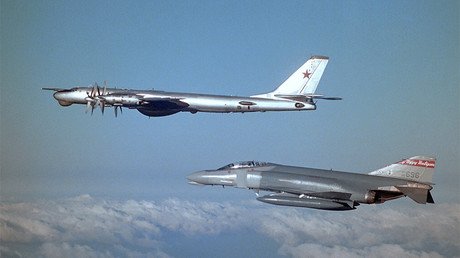German foreign minister to discuss INF missile treaty during Washington visit
Heiko Maas is en route to Washington, where he will discuss the US withdrawal from the INF missile treaty. The pullout is the latest Trump administration decision to upset European allies.
On Wednesday, the US officially informed Russia that it will withdraw from the Intermediate-Range Nuclear Forces treaty – originally signed by Ronald Reagan and Mikhail Gorbachev in 1987 – at the beginning of February.
Earlier, Washington claimed that Moscow is in breach of the treaty, and that the Russian 9M729 missile system violates the terms of the agreement. Russia remains open to dialog, Deputy Foreign Minister Sergei Ryabkov said.
Under the treaty, land-launched nuclear missiles with a range between 500 and 5,500km (311 and 3418 miles) are banned. Both sides have accused each other of breaching the agreement multiple times since it was drawn up over 30 years ago, but Moscow insists the 9M729 missile complies with the treaty.
The Russian military presented the missile to a conference on Wednesday to prove its compliance, but Washington declined to send any officials.
Maas has sided with the US assessment of the situation, and said on Wednesday that he is “banking on Russia correcting its violations of the treaty and disarming its cruise missiles so that the INF treaty still has a chance.”
Whatever short-range projectiles and long-range Intercontinental Ballistic Missiles the US and Russia choose to develop is outside Germany’s purview. However, once out of the INF treaty, the US could station intermediate range missiles in Europe, a flashback to the Cold War that Maas is keen to avoid.
“The deployment of new medium-range missiles would meet with widespread resistance in Germany,” he told German news agency DPA in December. “By no means should Europe become the scene of a debate on weapons build-up,” he added.
Rumblings of the Cold War were intensified by Trump’s announcement last week that the US will build 20 new ground-based interceptors to counter “missile launches from hostile powers,” and will press ahead with the development of a “space-based missile defense layer.”
Trump’s statement came after the Pentagon published a major report on missile defense, and after Russia successfully tested a hypersonic missile that can travel at 27 times the speed of sound and evade most current defense systems.
“The militarization of space is inevitable, and the United States will quit any relevant non-proliferation treaty that stands in the way,” Mikhail Khodarenok, a military expert and retired colonel who served in the Russian missile defense forces, told RT at the time.
Trump’s unilateralism
Nuclear weapons are just one area in which the US’ European allies have been left scrambling to save international agreements from the Trump administration’s ‘America First’ worldview.
Also on rt.com House passes bill preventing Trump from leaving NATO, tells allies to start pulling weightTrump’s withdrawal from the 2015 Joint Comprehensive Plan of Action (JCPOA, or the Iran deal) last May triggered panic in Europe. French President Emmanuel Macron tried to leverage his reputation as a ‘Trump whisperer’ to convince the US president to stay in the agreement, as did German Chancellor Angela Merkel.
Both failed to change Trump’s mind. The US withdrew from the deal, and fully reapplied multiple rounds of crippling economic sanctions on Tehran.
The Europeans, who remained party to the deal, were left in a bind: continue to trade with Iran and risk falling foul of US sanctions, or toe Washington’s line.
Likewise, US withdrawal from the Paris Agreement on climate change in 2017 triggered international condemnation from 28 EU member states and over 100 countries worldwide. Again, French President Emmanuel Macron tried to sweet-talk Trump into reconsidering, and again he failed to win him over.
With the Trump administration willing to disregard any treaties or agreements that stand in the way of America’s geopolitical goals, Maas may leave Washington disappointed.
As well as meeting with Secretary of State Mike Pompeo to talk about the INF withdrawal, Maas said that he hopes to find common ground with his US counterpart on “the fight against Islamic State, the Syria dossier, Afghanistan, (and) Ukraine.”
Like this story? Share it with a friend!














